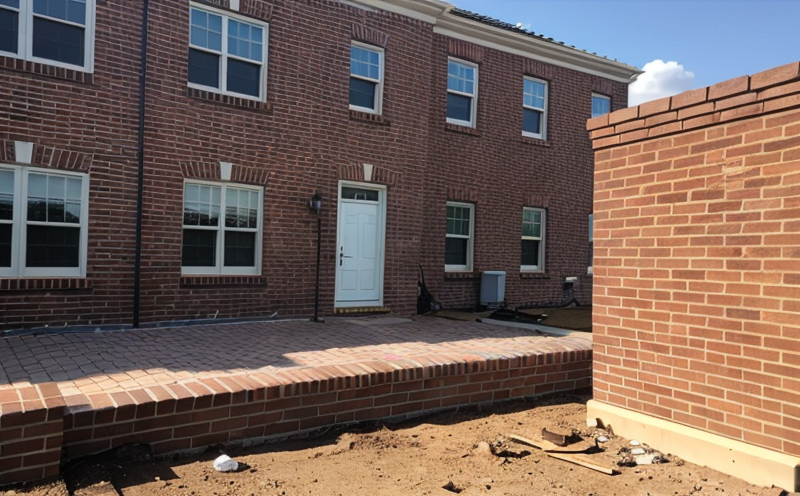Masonry & Brick Testing
The integrity and longevity of buildings and structures are closely tied to the quality of their masonry components. Masonry and brick testing is an essential step in ensuring that these materials meet the necessary standards for strength, durability, and safety. This service encompasses a range of tests designed to evaluate the physical properties, performance, and compliance with industry standards.
Masonry and brick structures are often subjected to various environmental conditions such as moisture, temperature fluctuations, and mechanical stresses. Understanding how these factors affect the materials is crucial for ensuring structural integrity over time. For instance, the compressive strength of bricks is a critical property that determines their ability to withstand loads. Similarly, the bond between bricks or mortar joints plays a significant role in the overall performance of the structure.
Testing methods vary depending on the specific requirements and standards applicable to the project. Common tests include compression testing, modulus of elasticity determination, water absorption measurement, freeze-thaw resistance evaluation, and flexural strength assessment. Each test provides insights into different aspects of masonry material behavior under stress or environmental exposure.
Standardization is paramount in this field; hence adherence to recognized international standards like ISO 10586-3 for compressive strength testing of bricks ensures consistency and comparability across various projects globally. Compliance with these standards not only guarantees high-quality products but also facilitates smoother regulatory approvals during construction processes.
In summary, masonry and brick testing serves multiple purposes from quality assurance to safety considerations. By employing rigorous testing protocols, stakeholders can make informed decisions about material selection while ensuring compliance with relevant regulations. This approach fosters trust among clients and enhances project success rates significantly.
Why It Matters
The importance of masonry and brick testing cannot be overstated when considering the long-term sustainability and safety of buildings and infrastructure projects. Poor quality materials can lead to premature failure, costly repairs, and potential hazards for occupants. Regular inspections and tests help identify issues early on, allowing timely interventions before they escalate into serious problems.
- Enhances structural integrity by identifying weak points in masonry components.
- Promotes compliance with local building codes and international standards.
- Avoids costly rework or reconstruction due to substandard materials.
- Safeguards public safety by minimizing risks associated with compromised structures.
By integrating thorough testing into the design phase, builders can optimize material usage, reduce waste, and improve overall efficiency. Moreover, reliable test results contribute positively towards reputation management for both contractors and suppliers involved in these projects.
Applied Standards
The testing of masonry and brick materials must adhere to specific international standards that ensure accuracy and consistency across different regions and industries. Some key references include:
- ISO 10586-3: Specifies methods for determining compressive strength of burnt clay bricks.
- ASTM C67: Provides guidelines for testing the physical properties of concrete masonry units (CMUs).
- EN 998-2: Covers the determination of modulus of elasticity and Poisson’s ratio for brickwork mortar.
- IEC 61572: Pertains to electrical characteristics of metallic materials used in building construction.
These standards provide a framework for conducting tests under controlled conditions, thereby producing reliable data that can be relied upon by architects, engineers, and clients alike. Adherence to these norms ensures uniformity among various projects worldwide, promoting best practices within the industry.
Why Choose This Test
Selecting the right testing method for masonry and brick materials is vital given their diverse applications in construction projects. Here are several reasons why choosing this type of test makes sense:
- Comprehensive Evaluation: Tests cover multiple parameters such as compressive strength, modulus of elasticity, water absorption rate, etc., providing a holistic view of material performance.
- Scientific Precision: Utilizes advanced instrumentation and techniques to achieve precise measurements, ensuring accurate results that reflect real-world conditions accurately.
- Regulatory Compliance: Ensures compliance with local regulations and international standards, facilitating smoother project approvals and reducing legal risks.
- Cost Efficiency: Early detection of defects through testing helps avoid unnecessary expenses later in the construction process due to failures or rework requirements.
The reliability and accuracy offered by these tests make them indispensable tools for ensuring quality control throughout the entire lifecycle of masonry and brick structures. Whether you're involved in new builds, renovations, or maintenance activities, investing time into proper testing pays off handsomely in terms of long-term benefits to both parties involved - clients and contractors.





